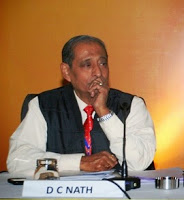President of Patriots Forum, D.C. Nath was superannuated in January, 1995, as the Special Director, Intelligence Bureau, D.C. Nath (IPS-1960) was associated with the International Institute of Security and Safety Management (IISSM), headquartered in New Delhi, for over 14 years, first as the Executive President & CEO and then as the President & Director General, between February, 1997 and March, 2011. The author of a highly acclaimed book, Intelligence Imperatives for India, Mr. Nath earned high plaudits from all around for two of his very significant presentations on: “Revisiting the Future of India” (2005, London) and “Lessons from India for the War On Terrorism” (2007, USA). He is the only one in the field, combining the experiences of a police officer with specialization in intelligence and strategic analysis and an industrial security expert par excellence. More Bio on D. C. Nath…
OPINION>>>>
17th May, 2017
Dear Friends,
JAI Hind!
Subject: IDIAN ECONOMY ON THE RIGHT TRACK
Only on March 30, 2017 the GST Bill was passed by Parliament. As we know, this has been more revolutionary than the demonitisation effected a few months back.
Many English dailies have written many Editorials and quite rightly so. We have taken the editorial from the Asian Age of March 31, 2017, titled “GST ON TRACK, BUT CHALLENGES REMAIN”. It is only correct that challenges should remain. The copy of the brief editorial is reproduced below:
Quote ()
GST on track, but challenges remain
Traders would have to be roped in to make GST work at its optimum levels, at which the widest tax base is made possible.
Description: Union Minister for Finance and Corporate Affairs Arun Jaitley at GST Council Meeting, at Vigyan Bhawan in New Delhi. (Photo: PTI)
Union Minister for Finance and Corporate Affairs Arun Jaitley at GST Council Meeting, at Vigyan Bhawan in New Delhi. (Photo: PTI)
There was more than a touch of the dramatic in the passage of four landmark bills to help unfurl what will be the single biggest tax reform since Independence — the Goods and Services Tax (GST). The sentiment in Parliament was in favour of enabling such a seminal moment in legislative history, when a nation as complex as India with its diversity and geographical spread, and raucous political alignments, makes way for a major tax reform. There was a broad consensus even as fears were voiced by some parties with legitimate concerns about their states. But the way this reform was pushed as a money bill, to overcome the government’s lack of a Rajya Sabha majority, may pose a threat to our basic democratic structure. The Elders can debate as much as they wish, but can do very little to effect any changes in this sweeping reform, though most of their concerns now have more to do with the Finance Bill than the GST.
The planned July 1 rollout bristles with difficulties as mountains must be moved to classify thousands of products and services, and do it in a spirit of give and take, while also ensuring prices don’t go through the roof. The complexity of keeping this as a federal contract with constitutional sanction, as the finance minister put it, shouldn’t break down while having to accommodate any regional whims while getting each state to pass the State GST laws in the next three months. The point is that while ushering in such a drastic fiscal change of national magnitude, one would rather rely on the expertise of the bureaucracy and economists to sort out issues than let it slide into a political slugfest fuelled by eternal one-upmanship.
The addition of two per cent to GDP is an over-optimistic projection much as the Congress whining about a notional loss of Rs 12 lakh crores due to the BJP opposing the reform when it was in the Opposition. This reform has been in the works for the past 17 years or so, which means everyone should have the good grace to accept it as a truly national enterprise. The creation of an anti-profiteering mechanism is about the worst facet of a monumental change in the very approach to taxation. While there is such a demand for trust to drive the exercise, GST should recognise that market forces will be in greater play and will be a natural controlling mechanism on the manufacture and sale of goods. Traders would have to be roped in to make GST work at its optimum levels, at which the widest tax base is made possible. The spirit of non-partisan cooperation to make GST possible should prevail in its functioning as well.
Unquote ()
Well, Friends, it has indeed been a master stroke to boost the Indian economy with the doctrine of “One country, one Tax”. The editorial concludes with the sane advice, “Traders would have to be roped in to make the GST work at its optimum levels, at which the widest tax base is made possible. The spirit of non-partisan cooperation to make GST possible should prevail in its functioning as well.
We are sure our esteemed readers would be happy to note that all important English newspapers have published what they thought would be correct to put the material on the editorial.
Yes, the challenges do remain. Otherwise, one would tend to suffer from a sense of complacency. That would sound the death-knell for human efforts to improve. ‘Challenges Must rpt Challenges Must exist’.
Vandemataram,
Your sevak,
D.C. Nath
(President, Patriots’ Forum)
(Former Spl. Director, IB)
Source: Patriots’ Forum






